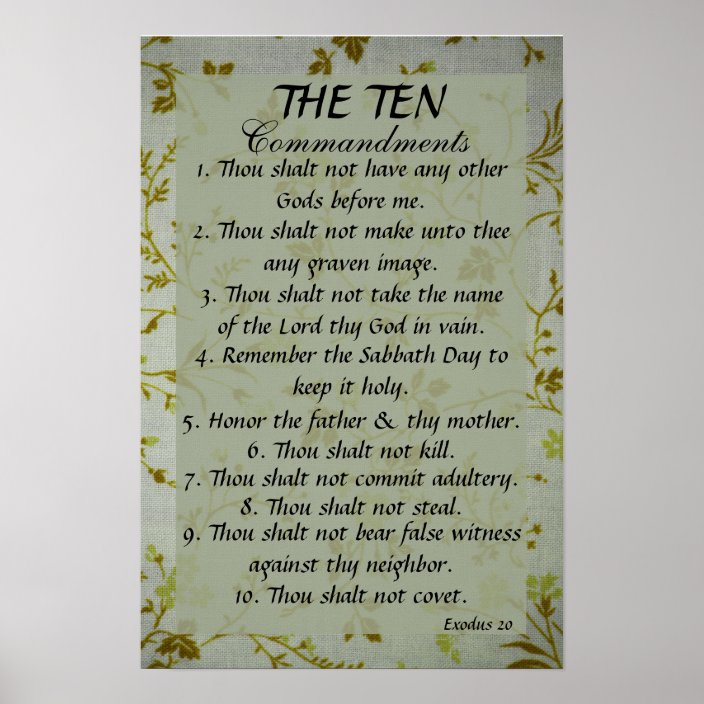
The second is like it, ‘You shall love your neighbor as yourself.’ On these two commandments depend the whole Law and the Prophets” (Matthew 22:36–40, NASB). New Testament believers are freed from the bondage of sin, which allows them to freely live out the Ten Commandments, summarized by Christ this way: “‘You shall love the Lord your God with all your heart, and with all your soul, and with all your mind.’ This is the great and foremost commandment. While it is true that Christ fulfilled the law on our behalf (see Matthew 5:17), the New Testament is clear that believers should not violate God’s moral law because of their standing in grace (Romans 6:15). Such thinking is likely not caused by an antinomian mindset, but instead stems from the principle that Christians are not under the law but under grace (Romans 6:14). To be clear: Thou shalt not obey the Ten Commandments” (p. Matthew 5:17-22 - Think not that I am come to destroy the law, or the. (Read More.) Leviticus 22:31 - Therefore shall ye keep my commandments, and do them: I am the LORD. Exodus 20:3-17 - Thou shalt have no other gods before me. For example, in his book Irresistible: Reclaiming the New that Jesus Unleashed for the World, Andy Stanley says, “The Ten Commandments have no authority over you. Bible verses related to Ten Commandments from the King James Version (KJV) by Relevance. Some Christians believe the Ten Commandments are not binding upon believers today.

The commandments reflect the unchanging character of God, so they-like God-are eternal, timeless, universally applicable, and immutable. Because it summarizes the moral content of God’s law, the Decalogue can be used as a mirror to show people their sin. The Ten Commandments help unbelievers in any age recognize their imperfections. Jesus, the Lord of the Sabbath, has become for us our Sabbath rest, according to Hebrews 4:1–11.)ĥ) Honor your father and your mother (Ephesians 6:1–2)Ħ) Do not murder (Romans 13:9 1 Peter 4:15)ħ) Do not commit adultery (1 Corinthians 6:9–10)ĩ) Do not give false testimony (Revelation 21:8) The Ten Commandments, short version: 1- You will not have other gods before me. In fact, Colossians 2:16 releases the believer from the Sabbath rule. But there is no direct or indirect command for believers in the church age to observe the Sabbath as a day of rest or of worship. (There are many references to the Sabbath day in the New Testament, including the assumption that Jews under the law in the time of Christ would be observing the Sabbath. Here are the Ten Commandments and where they are found in the New Testament:ġ) Do not worship any other gods (1 Corinthians 8:6 1 Timothy 2:5)ģ) Do not misuse the name of the LORD (1 Timothy 6:1)Ĥ) Remember the Sabbath day and keep it holy. Other times, he references them implicitly, like in 1 Timothy 1:8–10: “But we know that the Law is good, if one uses it lawfully, realizing the fact that law is not made for a righteous person, but for those who are lawless and rebellious, for the ungodly and sinners, for the unholy and profane, for those who kill their fathers or mothers, for murderers and immoral men and homosexuals and kidnappers and liars and perjurers, and whatever else is contrary to sound teaching” (NASB). Sometimes, he is explicit in reciting some of the commandments, as he does in Romans 13:9. Paul references the Decalogue a number of times in his epistles. The only commandment not repeated in the New Testament is the fourth one, the one about Sabbath-keeping. For example, in giving a summary of our moral responsibilities to one another, Jesus repeats four of the Ten Commandments to the young ruler in Mark 10:17–19.

The two relationships are inseparable elements, fundamental to being a follower of God.Nine of the Ten Commandments found in Exodus 20:1–17 are repeated in the New Testament numerous times in different ways. The remaining commandments address one's relationship with humans. The first four deal with one's relationship with God.

The commandments have a specific structure. What is significant about the way the Ten Commandments are arranged? The Lord revealed them to Moses in ancient times (see Exodus 20:117), and they are also referenced in whole or in part in other books of scripture (see. Protestant and Reformed traditions consider verse 2 a prologue and separate verses 3-4 into the first and second commandments, retaining verse 17 as one command.Ĥ. Roman Catholic and Lutheran traditions consider verses 3-4 to be the first commandment but separate verse 17 ("don't covet your neighbor's house don't covet your neighbor's wife") into two commandments. In Scripture the phrase used to designate the Ten Commandments is the Ten Words (Exodus 34:28 Deuteronomy 4:13 Deuteronomy 10:4). Jewish tradition considers verse 2 ("I am the Lord your God") to be the first commandment and verses 3-4 ("no gods before Me" and "no idols") as the second. Does everyone enumerate the Ten Commandments the same way?Īctually several different traditions exist regarding how the commands should be enumerated.


 0 kommentar(er)
0 kommentar(er)
